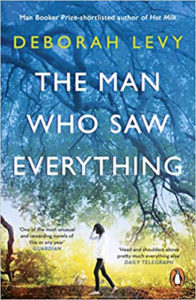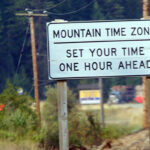Home »

Levy embraces possibilities and pulls down barriers
Book Review
By Derryll White
 Levy, Deborah (2019). The Man Who Saw Everything.
Levy, Deborah (2019). The Man Who Saw Everything.
To photograph people is to violate them, by seeing them as they never see themselves, by having knowledge of them they can never have; it turns people into objects that can be symbolically possessed. – Susan Sontag
Saul Adler, a young British historian, has been invited to Communist East Berlin. It is 1988, the Wall is still in place, and Saul has David Bowie tendencies. He is amorphous, curiously bi-sexual, and very aware of being Jewish.
Saul, and the story, drift in time and space. Deborah Levy consistently asks the reader to catalogue what is seen – who, where, when? What, in the end, is the reality within each of us? There are spectres lurking like the thought of what was seen before the lights go on – amorphous, indistinct thoughts. Do we know ourselves? Can we know others if we don’t know ourselves?
I know love, as I know it. Saul continues to question whether he knows love at all. Time bounces in the novel, as does history according to Arnold Toynbee, cyclically. But it also slows, leaving opportunity for someone to be politically incorrect but still relevant. Deborah Levy is great here – let each do exactly as he or she does. She breaks the boundaries of gender and nationality, encouraging the reader to encounter what is going on, right now.
“It’s like this Jennifer Moreau…” Saul says all the time. And it is never like that. Memory is the biggest player here, and Saul does not know how to embrace it. He struggles to make it real instead of dancing with it. Instead of creating and re-creating himself, Saul is stuck inside a photograph. I like what Deborah Levy does here, embracing the world’s possibilities and attempting to pull down all the human, mindful barriers.
********
“Don’t historians use contraceptives?” -Deborah Levy
********
Extracts from the novel:
 RESISTANCE – They were all the more impressive because most of the young Pirates had a school education that was under Nazi control. It took some doing to resist their minds being invaded before Poland was invaded.
RESISTANCE – They were all the more impressive because most of the young Pirates had a school education that was under Nazi control. It took some doing to resist their minds being invaded before Poland was invaded.
Our song is freedom, love and life,
We’re the Pirates of the Edelwweiss.
Their parents would have read newspapers such as Der Stürmen, crammed with ugly cartoon caricatures of Jews. On the way to school they might have passed shops that sold instruments to measure the difference in size between Aryan and non-Aryan skulls. The young Pirates attempted to make all things go away for a few hours when they met together.
FASCISM – Genocide offered opportunities to acquire wealth: abandoned factories, shops, family properties and furniture. Seventy-two trainloads of gold were sent to Berlin from Auschwitz. The gold had been gouged out of the teeth of men and women who would never see their home again. Fascism, working hand in hand with nationalism, had industrialized mass murder, organized the transportation of cheap poison gases and recruited euthanasia operatives.
TIME – Jennifer is walking down a sandy path by the salt marshlands near a coastal place called Wellfleet, New England. She is lying on her stomach amongst the tall reeds and she is inconsolable. At sunrise Jennifer leans and weeps against the door of a clapboard house. I know she has used up all her strength on whatever it is that lies behind the door. There is a cherry tree in the garden. When the wind blows its blossoms fall through the universe like pink rain.
HISTORY – I had lost my job. I was no longer a minor historian. Perhaps I was history itself, flailing around in a number of directions, sometimes all of them at the same time.
 – Derryll White once wrote books but now chooses to read and write about them. When not reading he writes history for the web at www.basininstitute.org.
– Derryll White once wrote books but now chooses to read and write about them. When not reading he writes history for the web at www.basininstitute.org.







